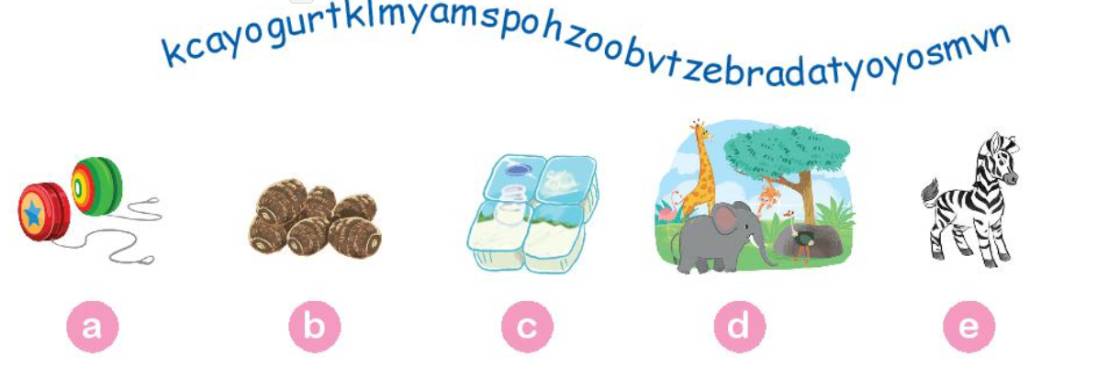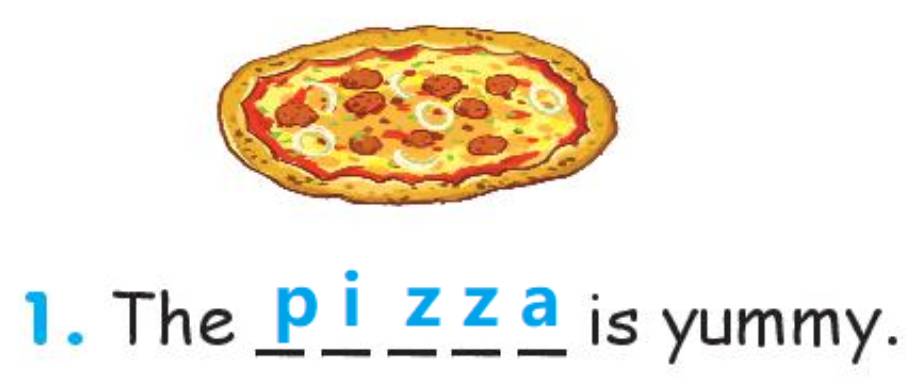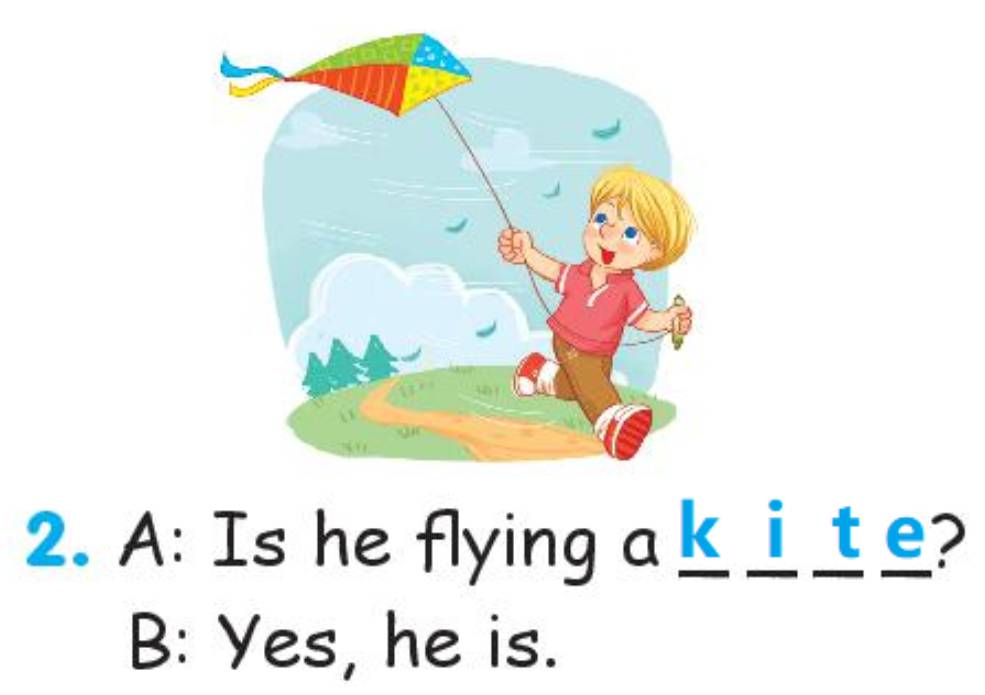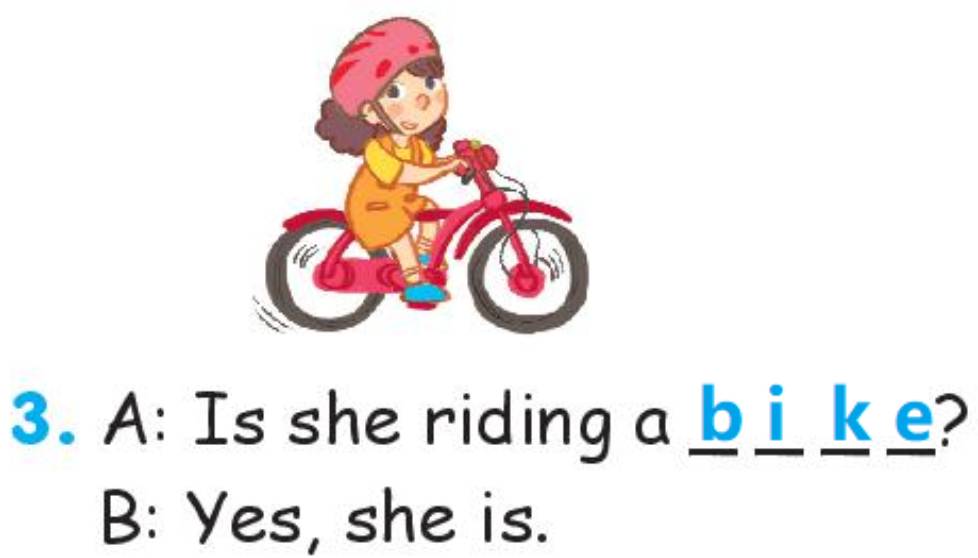Read and match. Then say. (Đọc và nối. Sau đó nói)
How to stay healthy
Read and complete. Then say aloud. (Đọc và hoàn thành câu. Sau đó nói to)
1. matter
2. has
3. doctor
4. stomach
5. rest
Hướng dẫn dịch:
Mai: Hôm nay cậu ấy không thể đi học.
Quan: Tại sao không? Có vấn đề gì với cậu ấy vậy?
Mai: Cậu ấy bị ho và sẽ đi gặp bác sĩ sáng nay.
Quan: Ổ, thật sao! Tội nghiệp cậu ấy!
Mai: Có chuyện gì với bạn thế Tony?
Tony: Mình bị đau ở bụng.
Mai: Ôi, bạn ơi. Bạn nên nghỉ ngơi đi và chút nữa đi bác sĩ.
Tony: Ừ, mình sẽ làm thế. Cảm ơn bạn, Mai.
Task 1. Circle and match. Then say.
(Khoanh tròn và nối. Sau đó nói.)

- yo-yos: con quay yo-yo
- yams: khoai lang
- yogurt: sữa chua
- zoo: sở thú
- zebra: ngựa vằn
Read and complete. Then say aloud. (Đọc và điền vào chỗ trống. Sau đó nói to)
| 1. trip | 2. zoo | 3. foot | 4.how | 5. have | 6. welcome |
Hướng dẫn dịch:
Mai: Chúng mình sẽ có một chuyến đi do trường tổ chức tuần tới.
Akiko: Các bạn định đi đâu?
Mai: Chúng mình sẽ đi sở thú.
Akiko: Nó có ở xa trường bạn không?
Mai: Không xa.
Akiko: Các bạn định đi bằng phương tiện gì?
Mai: Đi bộ.
Tony: Ngày mai mình sẽ đi đến Thành phố Hồ Chí Minh
Mai: Bạn định đến đó bằng phướng tiện gì?
Tony: Bằng máy bay bởi vì mình không có nhiều thời gian
Mai: Chúc bạn có một chuyên đi vui vẻ
Tony: Cảm ơn bạn nhiều, Mai.
Mai: Không có gì nhé.
5. Guess, read and circle. Then say.
(Đoán, đọc và khoanh tròn. Sau đó nói.)
1. a
(Mì ống thì ngon.)
2. a
(Tôi có thể nhìn thấy một cánh buồm.)
3. b
(Hãy ngắm nhìn con đường này!)
3. Look, read and write. Then say aloud.
(Nhìn, đọc và viết. Rồi nói to.)

1. The pizza is yummy.
(Bánh pizza thật ngon.)

2. A: Is he flying a kite?
(Anh ấy đang thả diều à?)
B: Yes, he is.
(Đúng vậy.)

A: Is she riding a bike?
(Cô ấy đang đi xe đạp à?)
B: Yes, she is.
(Đúng vậy.)
1. Read the text. Match the words in blue with the opposites in the box. Then listen and check.
(Đọc văn bản. Nối các từ màu xanh với từ trái nghĩa trong khung. Sau đó nghe và kiểm tra.)
unpopular bad new cheap horrible boring fast big |
Send us your photos!
What have you got ...
…in your pocket?
I've got money, a pen, my ID card for school (that photo isn't very nice!) and my mobile phone. It's old and slow now and it hasn't got a good camera. I want a new mobile, but they're expensive. (Paul)
…on your desk?
I've got books, one or two old video games, and these mini speakers. They're small, but they're really good. And I've got a photo of my cousins in Australia. They've got a pet parrot. His name's Sinbad and he's really popular with my cousins' friends. We haven't got a pet.
(Ben)
…in your bag?
I've got my books for school, my mobile and I've got this present for my dad. He hasn't got this book. It's about cooking and it's very interesting (if you like cooking!). (Maria)
Read and draw lines to match. (Đọc và vẽ các đường nối)
| 1.c | 2.a | 3.b |
Hướng dẫn dịch:
Tên mình là Liên. Vào thời gian rảnh, mình thường đi cắm trại với gia đình mình. Khu cắm trại ở trong rừng gần dòng sông Hồng (Red river). Chúng mình đến đó bằng xe buýt vào buổi sáng. Bố mình thích câu cá trên dòng sông này. Mẹ mình thích vẽ tranh. Mẹ mình thường vẽ tranh về trại. Mình thường đi leo núi trong rừng bởi vì mình thích thể thao. Chúng mình trở về nhà muộn vào buổi tối. Chúng mình rất thích đi cắm trại.
3. Read the Learn this! box. Then study the highlighted superlative forms in the text and match them with the rules.
(Đọc hộp Learn this! Sau đó nghiên cứu các dạng so sánh nhất được tô nền trong bài khóa và nối chúng với các quy tắc.)
LEARN THIS! Superlative adjectives
a. We add -est to short adjectives. (Chúng ta thêm -est vào các tính từ ngắn.)
rich – richer – richest slow -slower -slowest
b. Sometimes the spelling changes. (Đôi khi cách viết có thể thay đổi.)
foggy- foggier – the foggiest hot - hotter - the hottest
c. We put the most before long adjectives. (Chúng ta thêm most vào trước các tính từ dài.)
dangerous - more dangerous - the most dangerous
d. There are a few irregular comparative forms. (Cũng có một vài dạng so sánh bất quy tắc.)
good - better- the best bad - worse - the worst for- further - the furthest
e. We can use of after superlative adjectives. (Chúng ta có thể dùng of sau dạng so sánh nhất.)
the sunniest day of the week
f. We use in (not of) with nouns for groups or places. (Ta dùng in (không phải of) cho các danh từ dùng cho nhóm hoặc nơi chốn.)
the tallest boy in the class the biggest lake in the world
a. the toughest
b. the biggest
c. the most powerful; the most difficult
d. the worst
e. one of the biggest tsunamis
f. the most powerful (earthquake ever) in Japan; the (fifth) most powerful in the world
a: the toughest
b: the biggest
c: the most powerful, the most difficult
d: the worst
e: one of the biggest tsunamis
f:. the most powerful (earthquake ever) in Japan; the (fifth) most powerful in the world
4. Read how people in different countries celebrate their New Years. Then match the countries with the activities.
(Đọc về cách mọi người ở những quốc gia khác nhau tổ chức năm mới. Sau đó nối các quốc gia với các hoạt động.)
In Japan, temples ring their bells 108 times at midnight on December 31. By doing so, people believe the bad things of the past year will leave.
In Spain, people try to put 12 grapes in their mouth at midnight for good luck.
In Switzerland, they drop ice cream on the floor to celebrate the New Year.
In Romania, they throw coins into a river for good luck.
In Thailand, they throw water on other people to wash away bad luck.
Countries | Activities |
1. Japan 2. Spain 3. Switzerland 4. Romania 5. Thailand | a. put 12 grapes in the mouth b. ring bells 108 times c. throw coins into a river d. throw water on other people e. drop ice cream on the floor |